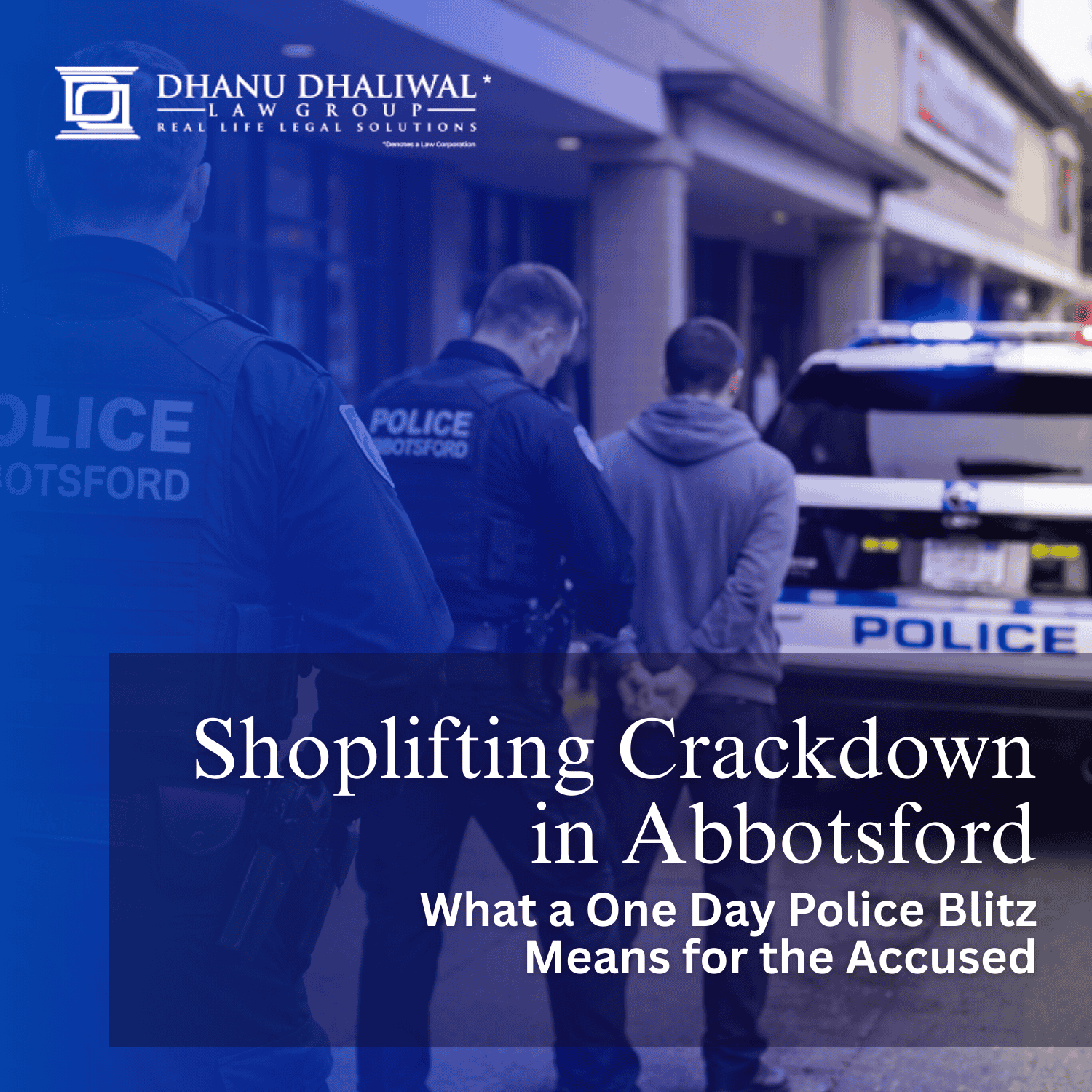Abbotsford Laundromat Stabbing Highlights Parole System Failures, Says Rob Dhanu KC
On Global News Radio, Rob Dhanu KC, co-founding partner of Dhanu Dhaliwal Law Group and former federal Crown prosecutor, weighed in on the case of Timothy Richard Rowley, the 40-year-old man accused of stabbing and seriously injuring an Abbotsford laundromat owner earlier this month.
Rowley, who has a long and violent criminal history, was out of prison on statutory release at the time of the attack. Documents reveal his troubling background, including a 2019 incident where he attempted to strangle a man with a shoelace before stabbing a paraplegic victim multiple times. Despite repeated breaches of parole conditions, Rowley was released again in 2022 after serving two-thirds of his sentence.
Mr. Dhanu explained that statutory release is required by Canadian law once offenders serve two-thirds of their sentence, unless the parole board finds clear evidence that they pose an undue risk of death or serious harm, a child sexual offence, or a serious drug offence. “The parole board’s discretion is extremely limited,” he said, noting that unless those strict thresholds are met, offenders must be released under conditions.
Rowley’s release came with multiple conditions, including bans on alcohol and drugs and mandatory supervision. But Dhanu questioned whether enough resources exist to enforce those conditions effectively. “There is follow-up, but the real question is whether it’s enough. In many cases, it isn’t.”
Dhanu acknowledged that cases like Rowley’s leave the public outraged and undermine trust in the justice system. He argued that Canada must do two things: give the parole board more tools to manage high-risk offenders and invest in early intervention to prevent at-risk youth from spiraling into criminal behaviour.
“This is a system failure,” Dhanu concluded. “And real people are suffering because of it.”
Transcript
Host (Jill Bennett):
We have more details about the man accused of stabbing and seriously injuring a laundromat owner in Abbotsford. This happened while the accused was out of prison on several conditions, imposed after a case where he stabbed a paraplegic man multiple times.
These details come from parole board documents obtained by Global News. The accused is 40-year-old Timothy Richard Rowley, who has now been charged with assault with a weapon and aggravated assault in this latest incident on August 9th.
We now know he was out of prison on a statutory release. To help us understand how this works — and why someone with such a lengthy criminal history would be released — we’re joined by Rob Dhanu, King’s Counsel, former federal Crown prosecutor, criminal defence lawyer, and co-founder of Dhanu Dhaliwal Law Group.
Rob, thank you for coming back on the show.
Rob Dhanu:
Good to be here, Jill.
Host:
When people hear about this, the first question is: why would somebody with such a violent record be released? Can you explain how statutory release works?
Rob Dhanu:
Absolutely. These are the cases we hate to see, where repeat offenders hurt people again. The big question is: if someone is sentenced, why don’t they serve the entire sentence?
This is exactly why parole — and statutory release — are among the most controversial and misunderstood aspects of Canada’s justice system.
The purpose of parole is actually to protect the public, ironically. It does this by gradually releasing offenders under supervision and conditions, while giving them access to rehabilitation resources. The idea is that offenders are more stable and less likely to reoffend if they’re supported during reintegration.
If offenders serve their full sentence and are simply released at the end with no supervision, no resources, no money — they are more likely to commit new crimes immediately. I see this with my clients: many don’t have basic life skills, and prison doesn’t teach them those skills. In fact, it often makes them worse.
Rowley is a case in point. His background is tragic: Indigenous, born to a 16-year-old mother, his father died when he was three, he was raised by grandparents who later separated, and he grew up surrounded by substance abuse. It was almost inevitable that he would follow a troubled path.
Host:
One thing that stood out in the parole documents was a 2019 incident. While intoxicated, Rowley assaulted a man being interviewed by police and tried to strangle him with a shoelace. Hours later, he broke into the home of a 57-year-old paraplegic man, set a fire on the stove, and stabbed the man several times before being stopped by a neighbour.
Despite this, he was granted day parole in November 2022, ordered into a substance abuse program, and later breached his conditions. He failed to return to the facility, was arrested, and returned to custody. Yet eventually, he was released again.
Does that history not weigh heavily when the parole board decides whether to grant release?
Rob Dhanu:
Absolutely, and people should be outraged when they hear this. But the parole board’s hands are somewhat tied.
Statutory release is required by law after two-thirds of a sentence is served. The parole board must impose conditions to minimize risk, but they can only refuse release if very strict criteria are met.
They must be satisfied that the offender poses an undue risk — specifically that they are likely to:
-
Cause death or serious harm,
-
Commit a child sexual offence, or
-
Commit a serious drug offence.
Those are the only three grounds. So unless those thresholds are clearly met, the board must release the offender. If we want to change that, Parliament needs to give the board broader discretion.
Host:
Rowley had about eight conditions, including where he had to live, bans on alcohol and drug use, and reporting all relationships. But is there enough follow-up to make sure offenders actually follow these conditions?
Rob Dhanu:
There is follow-up — but the real question is whether it’s enough. And in many cases, it isn’t.
The system is underfunded and overstretched. There aren’t enough officers, treatment programs, or resources. So yes, conditions are imposed and checked, but not at the level needed to truly prevent reoffending.
Host:
Does the fact that Rowley is now accused in another violent attack — against a laundromat owner — change things?
Rob Dhanu:
Absolutely. This is a huge issue for the parole board, because their primary mandate is to protect the public. When someone on release commits a violent offence, it undermines confidence in the system.
Next time he appears before the parole board, they’ll have to consider this very carefully. But it goes beyond just the board. The Crown, police, and corrections need to coordinate on these cases. The Crown should be asking whether this individual qualifies for a long-term supervision order or even a dangerous offender designation.
Host:
How rare is it to see someone designated a dangerous offender?
Rob Dhanu:
It used to be very rare when the law was first introduced. But now it’s becoming more common, as are long-term supervision orders.
A dangerous offender can be kept in prison indefinitely, though there are reviews — I believe after seven years. It’s not a permanent “lock them up and throw away the key,” but it does give the justice system more tools to protect the public from high-risk offenders.
Host:
People get angry with cases like this. Despite all the conditions in place, someone with a violent history is accused of another brutal crime. That doesn’t give the public much confidence.
Rob Dhanu:
And it shouldn’t. Because the system failed, and now real people are suffering.
The truth is we need to focus on root causes. Rowley’s history is tragic: childhood neglect, substance abuse, no stability. By the time people like him are before the courts, it’s too late — Humpty Dumpty has already fallen off the wall.
The real solution is early intervention. Identifying at-risk children, supporting vulnerable families, and addressing problems before they turn into criminal behaviour. But that requires resources, planning, and expertise — and government isn’t always good at that.
Host:
Rob Dhanu, thank you for your time today.
Rob Dhanu:
My pleasure.
Host:
That was Rob Dhanu, King’s Counsel, former federal Crown prosecutor and co-founding partner of Dhanu Dhaliwal Law Group.
This case shines a harsh light on the limits of Canada’s parole system. As Mr. Dhanu explained, parole is designed to protect the public — but without proper resources, oversight, and legislative reform, repeat offenders continue to slip through the cracks.
At Dhanu Dhaliwal Law Group, we are committed to protecting our communities and providing clear, experienced insight into the criminal justice system. If you have questions about how parole works, statutory release, or your rights as a victim or accused, contact our team today at 604.746.3330.




